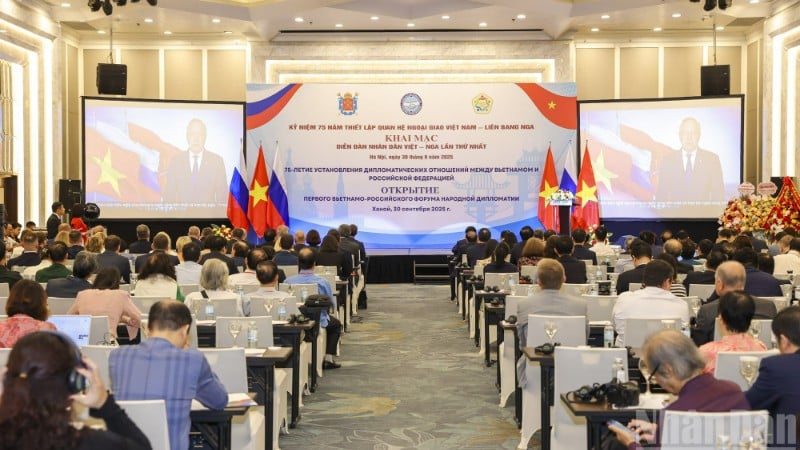
Culture, education , art - Bridge between the people of Vietnam and the Russian Federation
That is the comment of Ms. Mai Nguyen Tuyet Hoa, First Secretary in charge of education, representative of the Ministry of Education and Training of Vietnam in the Russian Federation at the Workshop "Culture, education, art: Connecting heritage and future" - an event within the framework of the first Vietnam-Russia People's Forum.
Emphasizing that people-to-people diplomacy is an important pillar supporting state diplomacy , especially in the fields of culture and education, Ms. Mai Nguyen Tuyet Hoa said that the combination of the two fields of culture and education in people-to-people diplomacy is of great significance. Education is the most effective way to transmit culture and culture is the foundation to enrich spiritual life in the educational environment.
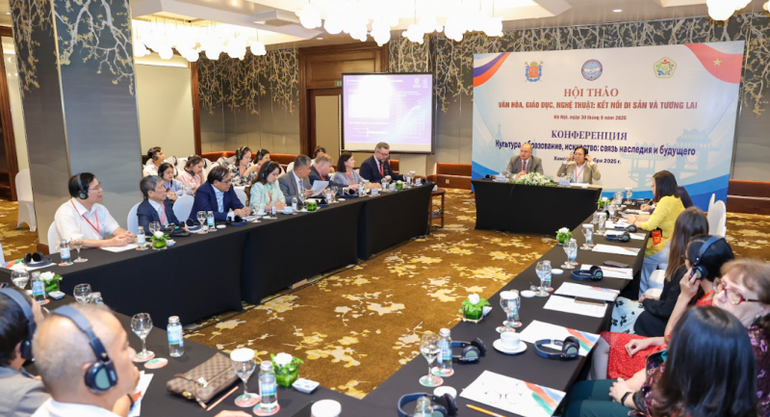
To prove the assertion that education is the most effective way to transmit culture and culture is the foundation, enriching spiritual life in the educational environment, Ms. Mai Nguyen Tuyet Hoa said: In Russia, activities to promote Vietnamese culture are implemented in a diverse and rich manner, such as "Vietnam Day" events at major universities, cultural and artistic festivals, a series of programs honoring the Vietnamese language, as well as academic and artistic forums. These activities not only help international friends better understand the country, culture and people of Vietnam, but also create opportunities for Vietnamese students to practice their skills, nurture national pride and become cultural ambassadors in the international environment.
In addition, the Vietnam Cultural Festival 2025 with the theme "Vietnam - Colors from the Tropics" at Red Square, Moscow took place in July 2025, attracting nearly 1 million visitors, affirming the influence of cultural diplomacy in strengthening friendship between the two peoples. Dialogue programs and meetings between intellectuals, artists and politicians also contributed to connecting generations, inspiring and orienting the young generation of Vietnam in Russia.
Affirming that culture, education and art are important bridges connecting the people of Vietnam and the Russian Federation, according to Ms. Mai Nguyen Tuyet Hoa, in the coming time, to continue promoting the image of Vietnam in the Russian Federation, we need to: support the establishment and maintenance of Vietnamese Cultural Clubs at major universities in Russia, organize "Vietnam Day" activities; develop "Open Cultural Classes", bring content introducing Vietnam into fixed lessons at Russian high schools and universities; promote Vietnamese culture through short videos on digital platforms; connect former Russian students to inspire and orient the current generation of international students; closely coordinate with Russian partners at the grassroots level to organize cultural events.
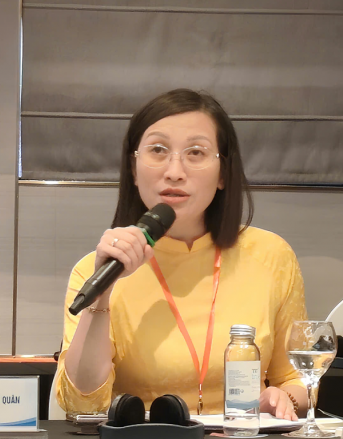
Regarding the field of culture and art, Ms. Albina Legostaeva - representative of the State Museum of the Orient (Russian Federation) said that promoting Vietnamese art in Russia, which began in the mid-20th century with the important contribution of people-to-people diplomacy. The collection of precious artifacts from Vietnam at the Museum is a vivid demonstration of the traditional friendship between Vietnam and the Russian Federation. During the Covid-19 pandemic, the two sides have promoted new forms of cooperation such as online exhibitions and seminars, diversifying cooperation directions in the field of museum exchange.
“Cultural diplomacy and people-to-people exchanges are not only the foundation of political-economic dialogue, but also contribute to building a positive image of the country in the international arena. I hope that in the future, Vietnam-Russia museum cooperation will continue to expand and deepen, becoming an important channel in the Vietnam-Russia Comprehensive Strategic Partnership,” said Ms. Albina Legostaeva.
Science, technology, health - New driving force for Vietnam-Russia cooperation
As the host of the Workshop "Science, technology, health: New driving force for Vietnam-Russia cooperation" - one of the activities within the framework of the first Vietnam-Russia People's Forum, Professor - Doctor of Science Nguyen Dinh Duc, Chairman of the Council of the University of Technology, Vietnam National University, Hanoi, said that in the context of Vietnam implementing Resolution 57-NQ/TW, considering science, technology, innovation and digital transformation as strategic breakthroughs, strengthening cooperation with Russia, a country with strong science and technology in biomedicine, energy, environment, etc., is of great significance and this can become a key field, a new driving force to promote the Vietnam-Russian Federation Comprehensive Strategic Partnership.
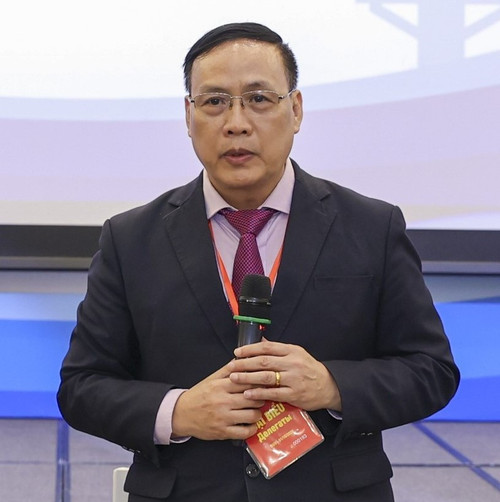
Providing an overview of scientific and technological cooperation between Vietnam and the Russian Federation, Ms. Vu Thi Tu Quyen, Deputy Director of the Department of International Cooperation, Ministry of Science and Technology, said: Vietnam and the Russian Federation both promote the role of science and technology and set out long-term development strategies. In particular, Russia identified the period 2022-2031 as the "decade of science and technology", with the goal of enhancing the role of science in solving important tasks of society and the country, and expected domestic spending on research and development to reach at least 2% of GDP by 2030. Similarly, Vietnam issued Resolution No. 57-NQ/TW dated December 22, 2024, identifying science and technology as the key driving force for innovation, digital transformation, and improving competitiveness, aiming for Vietnam to become a developing country with modern industry by 2030 and a developed country with high income by 2045.
“Vietnam-Russia scientific and technological cooperation has a long tradition and is an inseparable part of the friendly and mutually beneficial relationship. Immediately after establishing diplomatic relations, the two sides prioritized scientific and technological cooperation through the 1959 Agreement between the Democratic Republic of Vietnam and the Soviet Union, followed by the 1992 Agreement on Scientific and Technological Cooperation between Vietnam and the Russian Federation, and the 2014 Agreement on Strategic Partnership in the Field of Education, Science and Technology.
Through the Vietnam-Russia Joint Committee on Science and Technology and the Vietnam-Russia Intergovernmental Committee on Economic, Trade and Scientific and Technical Cooperation, cooperation between the two sides has brought about many results: from basic research, natural sciences, social sciences and humanities to peaceful nuclear energy, biotechnology, medicine, agriculture, information technology, automation and artificial intelligence,” Ms. Vu Thi Tu Quyen shared.
In addition to bilateral cooperation, Vietnam and the Russian Federation also coordinate at multilateral forums such as the Association of Southeast Asian Nations (ASEAN), the Asia-Pacific Economic Cooperation (APEC), the International Atomic Energy Agency (IAEA), the World Intellectual Property Organization (WIPO) and standards, metrology and quality organizations.
According to the Deputy Director of the Department of International Cooperation Vu Thi Tu Quyen, in the coming time, science and technology will continue to be an important bridge to promote understanding and trust between the two countries. Accordingly, the two sides need to promote the Intergovernmental Committee mechanism as a mechanism for strategic orientation and coordination of scientific and technological cooperation, while promoting cooperation in bilateral and multilateral mechanisms, encouraging people-to-people exchanges, academic exchanges between institutes, schools, businesses and social organizations and prioritizing cooperation in the fields of: digital technology, artificial intelligence, clean energy, nuclear energy for peaceful purposes, new materials, advanced medicine, biotechnology, aerospace-aviation technology...
In addition, the two sides need to create conditions for science and technology enterprises to connect and exploit each other's markets, jointly develop new and strategic technologies, and at the same time build a Vietnam-Russia science and technology cooperation center in priority fields.
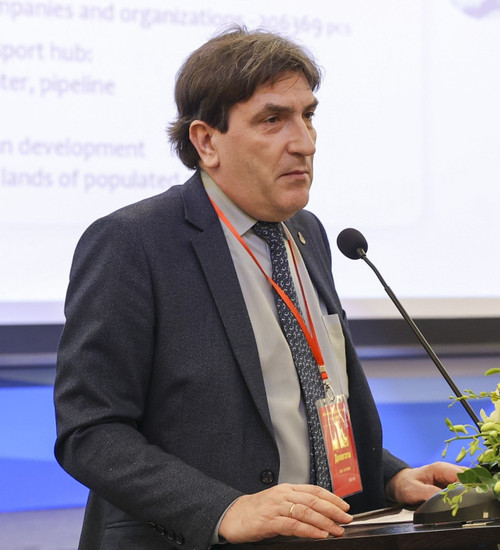
Among the achievements of cooperation in the field of science and technology between Vietnam and the Russian Federation, the Vietnam-Russia Tropical Center is a typical model. The Vietnam-Russia Tropical Center was established in 1988 on the basis of the Intergovernmental Agreement signed between the two States. From the beginning, the Center developed 3 main research fields, built 3 branches in 3 regions of Vietnam, while the Russian side established laboratories in Moscow, including the Dioxin laboratory with the most modern equipment at that time. Currently, the Center has 19 laboratories, 3 climate testing stations, 3 biological stations, 1 scientific research ship and nearly 1,000 Vietnamese-Russian officials and experts.
According to Dr. Andrey Nikolaievich Kuznetsov, Director General of the Russian side of the Vietnam-Russia Tropical Center, up to now, 57 scientific and educational organizations of the Russian Federation have participated in regular cooperation with the Center. Fixed and mobile laboratories, along with a program to train highly qualified staff, will contribute to strengthening national sovereignty, especially in the research of natural pathogens and disease forecasting. In May 2024, the Vietnam-Russia Tropical Center received the scientific research vessel "Professor Gagarin", opening a new stage of cooperation in the research of tropical seas and oceans.
As a member of the Russian Federation Delegation attending the first Vietnam-Russia People's Forum, Dr. Ivan Serebritsky, PhD in Geology and Mineral Sciences, Vice Chairman of the Committee for Environmental Management and Ecology, shared the experience of Saint Petersburg city in building a three-level environmental monitoring system (central, local, grassroots), thereby suggesting directions for cooperation between research and training institutions of Vietnam and the Russian Federation.
Dr. Ivan Serebritsky said that as a city facing many environmental challenges, Saint Petersburg has adopted a long-term strategy until 2035, focusing on building a culture of environmental protection and mobilizing the participation of the whole society.
Specifically, the city has relocated dozens of industrial establishments from the center, completely switched to using natural gas, and operated an air monitoring system with 27 automatic stations measuring more than 20 indicators, operating 24/7 with a cycle of 20 minutes/time, along with a number of mobile stations that can monitor up to 140 indicators. People can submit environmental complaints through both electronic and traditional channels. Each year, the government receives about 1,100 complaints, mainly related to air quality. The inter-agency environmental committee, including representatives of the central government and the city, has helped to quickly handle the problems. The obvious result is that the number of complaints about strange and unpleasant odors has decreased by 30% in the period 2023-2024.
“Currently, Saint Petersburg also applies artificial intelligence, integrating data from thousands of traffic cameras to assess air quality in real time. The results show that air quality has reached a safe level, proving the efforts to combine technology, management and social consensus in environmental protection,” Dr. Ivan Serebritsky added.
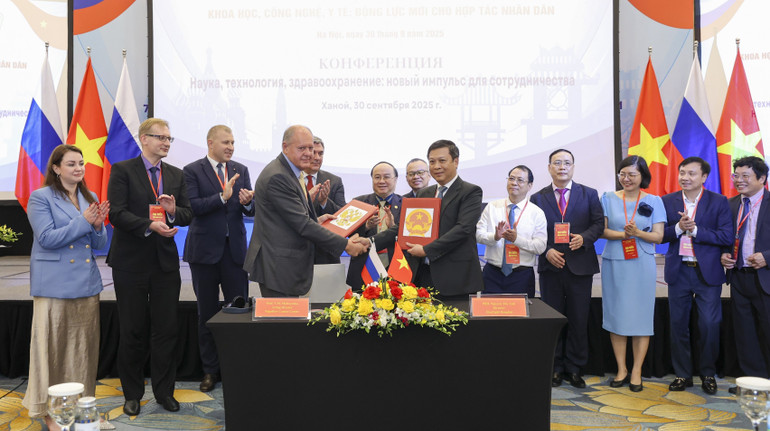
In the medical field, pointing out the potential for cooperation between Vietnam and the Russian Federation, including promoting cooperation in cancer examination and treatment, Professor-Doctor of Medicine Vladimir Moiseenko, Director of the Napalkov Oncology Center, People's Doctor of the Russian Federation, Member of the Correspondent of the Russian Academy of Sciences, warned of the dominance of pharmaceutical corporations in cancer treatment, causing treatment costs to be too high while effectiveness is limited.
Based on that reality, Professor Vladimir Moiseenko suggested that in the coming time, Vietnam and Russia should coordinate research and optimize treatment regimens to improve efficiency and reduce financial burden for patients.
Based on the achievements of cooperation in the fields of science, technology and health between Vietnam and the Russian Federation, once again, Professor-Doctor of Science Nguyen Dinh Duc, Chairman of the Council of the University of Technology, Vietnam National University, Hanoi affirmed that the potential and room for cooperation in the above fields are very large, especially in the fields of health, tourism, new technology and human resource training. To fully exploit the potential, according to Professor Nguyen Dinh Duc, the two sides need to organize more in-depth thematic forums to realize opportunities and put Vietnam-Russia cooperation plans into practice.
Source: https://nhandan.vn/hien-thuc-hoa-co-hoi-dua-cac-ke-hoach-hop-tac-viet-nam-lien-bang-nga-di-vao-thuc-chat-post912143.html






![[Photo] Students of Binh Minh Primary School enjoy the full moon festival, receiving the joys of childhood](https://vphoto.vietnam.vn/thumb/1200x675/vietnam/resource/IMAGE/2025/10/3/8cf8abef22fe4471be400a818912cb85)
![[Infographic] Notable numbers after 3 months of "reorganizing the country"](https://vphoto.vietnam.vn/thumb/1200x675/vietnam/resource/IMAGE/2025/10/4/ce8bb72c722348e09e942d04f0dd9729)
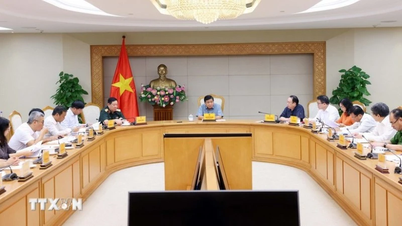
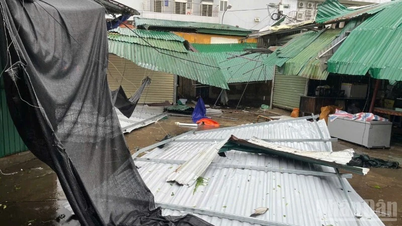
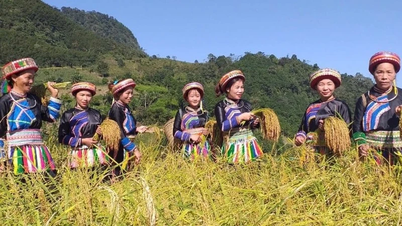
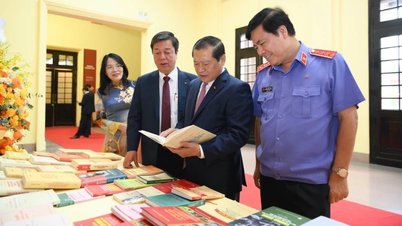
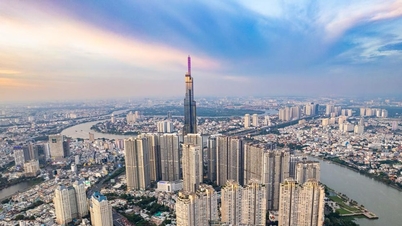

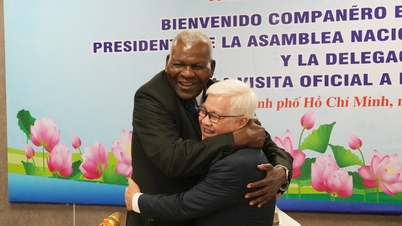




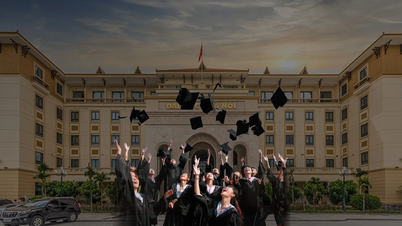
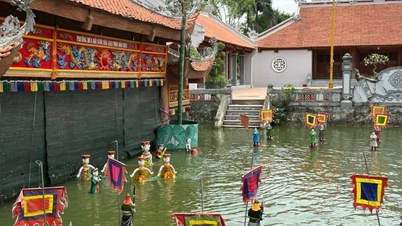

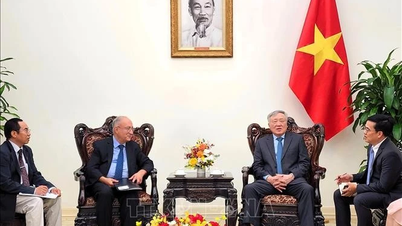
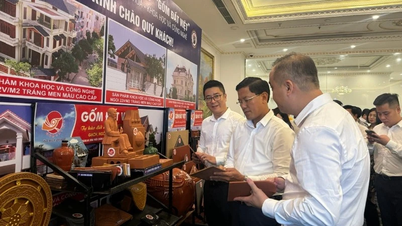


![[Photo] Prime Minister Pham Minh Chinh chairs meeting to deploy overcoming consequences of storm No. 10](https://vphoto.vietnam.vn/thumb/1200x675/vietnam/resource/IMAGE/2025/10/3/544f420dcc844463898fcbef46247d16)


































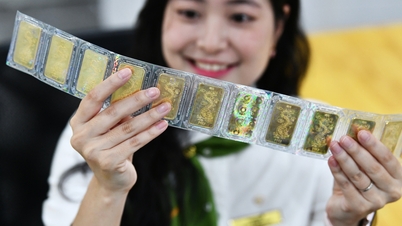


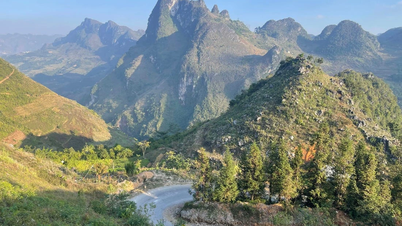


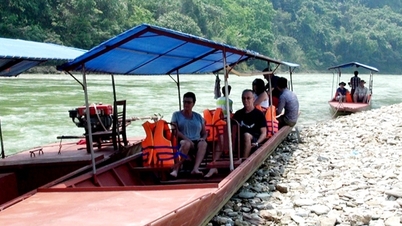








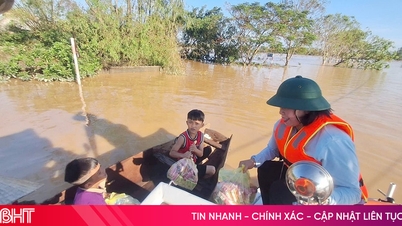

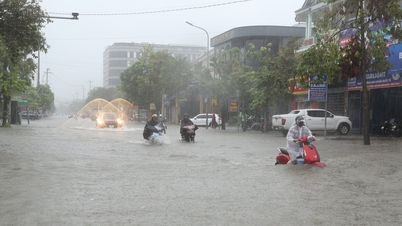

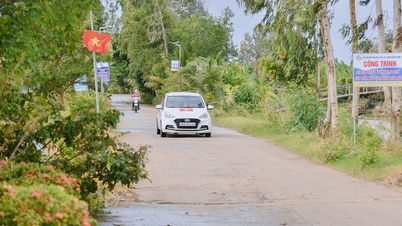

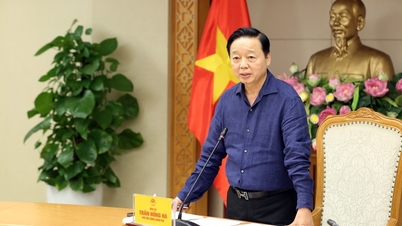

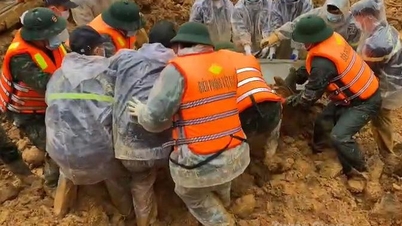

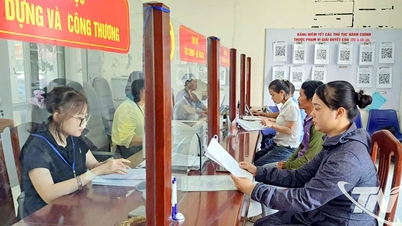













Comment (0)